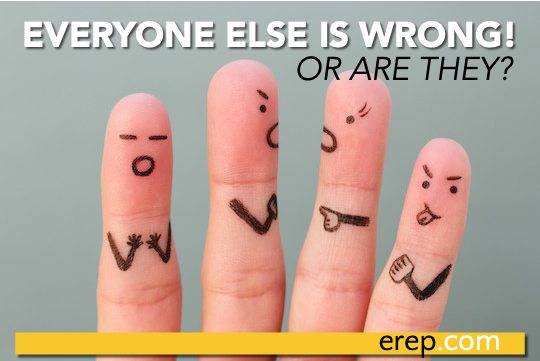Everyone Else is Wrong! Or Are They?
- By
- Steve Williamson, VP Digital Content at eRep
- Posted
- Monday, April 24, 2023

You see the world through a unique lens. Your personality (psychometric profile) determines how you perceive the world and prefer to operate within it. When you engage with people who have different profiles, those differences can alter your ability to align your perspectives.
This is all a fancy way of stating a more obvious fact most of take for granted: we will easily get along with a few people, partially get along with most, and completely disagree with practically everything said by a few others.
Is it pheromones? Do we agree or disagree because of a difference in biology?
Our life experiences surely play a part. We're probably more likely to get along with someone who shared a similar childhood, or maybe you have the same religious views (or views about religion). Maybe you went to the same school or your parents had the same politics (so you likely have the same politics as well).
It's easier to get along with people who share common interests or history, at least at first.
Have you ever met someone who you despised — or loved — from the start, before you ever learned anything about them? How does that happen?
What makes you see other people in a positive or negative light?
Contrary to popular belief, much of the core of your personality is innate and unchanging. Your psychometric profile, as the experts call it, is essentially your personality's DNA and isn't something you can alter. There is, of course, an element of your personality that is shaped by your experiences.
How you see the world, how you see yourself, and how you see others is shaped to a certain degree by your past. If you were traumatized by a bully in school or had an incredibly positive experience visiting your grandparents as a child, both will impact how you see people today who remind you of those impactful individuals from your past.
Your default way of seeing others is shaped in large part by your psychometric hardwiring, however. This is that part of your emotional 'lizard brain' that will determine if you immediately loathe or love someone from the moment you meet.
Those who share similar psychometric profiles to your own will by default be more agreeable in your eyes than those who have wildly different psychometric profiles. In essence, those with similar psychometric profiles will think the same way. You will naturally have perspectives in common and you will also likely enjoy activities that share the same characteristics.
Can compatibility between individuals be computed? It is fairly easily to determine similarity, but not quite as easy to determine compatibility. The differences between these terms may seem purely semantic, but underneath these words are some important distinctions.
Let's assume that when similarity exists, compatibility is highly likely to also exist.
Can compatibility exist in the absence of similarity?
You can get along with someone who has a different psychometric profile (compatibility but not similarity), but it takes two things to make it happen: knowledge and honor.
First, you must have knowledge of the other person's psychometric profile as well as your own. This knowledge gives you the information you need to understand how each of you sees the world and prefers to operate within it. Without that knowledge, both of you will be flying the Himalayas in a plane with no windows.
Second, once you know what your two profiles share and don't share, you must honor your differences. There is no perfect or imperfect psychometric profile. There is no right or wrong in this context. By knowing the other person's perspective, by understanding how and why they see the world through their particular lens, you can honor and respect how their psychometric profile has equal value to your own. In fact, you can learn to appreciate those differences because the other person can see things in ways that you don't.
In the workplace, it is not uncommon for people who don't share the same psychometric profiles to still have great respect and professional admiration for each other despite their differences in personality. This comes from honoring the fact that each person is specifically suited to the psychometric needs of their role. Because they are the right person in the right seat, they are very good at what they do. That tends to foster respect.
Determine your own psychometric profile and gain the knowledge of how you see the world and why.
Learn how to identify the psychometric profile of others. Understand where their profile differs from your own, and learn to honor and respect those differences.
Through this approach, you can gain compatibility in the absence of similarity.
And can't we all agree the world needs a bit more of that?
Go to eRep.com/core-values-index/ to learn more about the CVI or to take the Core Values Index assessment.

Steve Williamson
Innovator/Banker - VP Digital Content at eRep
Steve Williamson writes about work, teams, and the practical challenges of building systems that have to function in the real world. His background spans three decades of project management, software development, and technical team leadership across a range of industries. Outside of eRep, Steve is the author of a series of fantasy novels and most recently a murder mystery set in Portland, Oregon, and enjoys cycling and old-school tabletop role-playing games.
View additional articles by this contributor
Essentials
Additional Reading
Stay Updated
Employer Account Sign-up
Sign up for an employer account and get these features and functions right away:
- Unlimited Job Listings on eRep.com
- Applicant Search
- Applicant Tracking System (ATS)
- Unlimited Happiness Index employee surveys
- 3 full/comprehensive CVIs™
- No credit card required — no long-term commitment — cancel at any time
